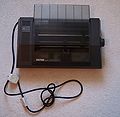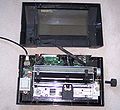Difference between revisions of "Amstrad DMP1 printer"
(→Seikosha GP500 Series) |
(→Seikosha GP500 Series) |
||
| Line 48: | Line 48: | ||
* Seikosha GP500A - Was offered as '''Seikosha GP500A''' for general purpose (centronics port) | * Seikosha GP500A - Was offered as '''Seikosha GP500A''' for general purpose (centronics port) | ||
* Seikosha GP500AS - Was offered as '''Seikosha GP500AS''' for general purpose (serial rs232 port) | * Seikosha GP500AS - Was offered as '''Seikosha GP500AS''' for general purpose (serial rs232 port) | ||
| − | * Seikosha GP500M-2 - Was offered as '''Amstrad DMP1''' for CPC (centronics 36pin port) (plus 2K SRAM) | + | * Seikosha GP500M-2 - Was offered as '''Amstrad DMP1''' for CPC (centronics 36pin port) (plus 2K SRAM) (BIOS: 8DE-1) |
* Seikosha GP500VC - Was offered as '''Commodore MPS-801''' for VIC20 and C64 (commodore 6pin serial port) ([[Media:Commodore MPS801 Printer Manual.txt|manual]]) (90-byte buffer, no 2K SRAM) | * Seikosha GP500VC - Was offered as '''Commodore MPS-801''' for VIC20 and C64 (commodore 6pin serial port) ([[Media:Commodore MPS801 Printer Manual.txt|manual]]) (90-byte buffer, no 2K SRAM) | ||
| − | * Seikosha GP500AT-1 - Was offered as '''Atari 1029''' for Atari XL (dual 13pin port) | + | * Seikosha GP500AT-1 - Was offered as '''Atari 1029''' for Atari XL (dual 13pin port) (no 2K SRAM) (BIOS: 8AT-1) |
The main difference is that the PCBs are customized - the VC and AT models have non-centronics connectors. The ROMs might be also customized, possibly containing different character sets (?), and most probably different protocols (for the serial-port VC version at least). | The main difference is that the PCBs are customized - the VC and AT models have non-centronics connectors. The ROMs might be also customized, possibly containing different character sets (?), and most probably different protocols (for the serial-port VC version at least). | ||
Revision as of 06:45, 21 August 2010
Amstrads first printer. DMP Stands for Dot Matrix Printer. Manufactured by Seikosha.
A very basic unit which had no descenders on letters such as y,j,q, or p, leaving for a very strange looking printout. This could be corrected (when using TasWord), but using the TasPrint program, but the effect was often not totally satisfactory.
It took only tractor feed paper and had no option or ability to accept single feed sheet.
Ribbons were tiny in comparison to other makes and ran out very quickly - they were, however, very easy to re-ink a few times.
Contents
Technical
This printer is a rebadged SEIKOSHA GP-500M-2.
It has a 2732 EPROM labelled 8DE-1 a 6116 RAM and a NEC 8039H CPU.
The following ICs are labelled on the PCB:
P1 = 74LS04 P2 = 74LS374 P3 = 74LS32 P4 = 74LS373 P5 = HM6116P-4 (2K*8 static RAM) P6 = 2003 P7 = NEC uPD8039LC (8bit CPU, 27 I/O Lines, 128 bytes RAM) P8 = 2732 EPROM (8DE-1) P9 = 7404 P10 = 74LS74 P11 = Intel 8243 (MCS-48 INPUT/OUTPUT EXPANDER) P12 = 2732 EPROM (32k -4kb*8) (NOT FITTED) SW1 dipswitch (accessible on outside) two fuses
Pictures
Seikosha GP500 Series
The Seikosha GP500 Series was offered for various homecomputers, around 1984-1985. All models support 10" endless paper. The case-design is more or less identical, though differently coloured, and badged with different manufacturer & model names.
- Seikosha GP500A - Was offered as Seikosha GP500A for general purpose (centronics port)
- Seikosha GP500AS - Was offered as Seikosha GP500AS for general purpose (serial rs232 port)
- Seikosha GP500M-2 - Was offered as Amstrad DMP1 for CPC (centronics 36pin port) (plus 2K SRAM) (BIOS: 8DE-1)
- Seikosha GP500VC - Was offered as Commodore MPS-801 for VIC20 and C64 (commodore 6pin serial port) (manual) (90-byte buffer, no 2K SRAM)
- Seikosha GP500AT-1 - Was offered as Atari 1029 for Atari XL (dual 13pin port) (no 2K SRAM) (BIOS: 8AT-1)
The main difference is that the PCBs are customized - the VC and AT models have non-centronics connectors. The ROMs might be also customized, possibly containing different character sets (?), and most probably different protocols (for the serial-port VC version at least).
Note: The name "Seikosha GP 500M-2" is printed on the PCB, in the internet, it's often referred to as "Seikosha GP 500 CPC".
DMP1 Control Codes
chr(0Ah) CR+LF chr(0Dh) CR or CR+LF (switch-selectable) chr(14h) CR chr(0Eh) Double Width Mode chr(0Fh) Normal Width Mode chr(10h),"NN" Print Position in character units (NN = two-digit ASCII, "00..79") chr(1Bh,10h,hi,lo) Print Position in dot units (hi:lo = 9bit binary, 0..479) (lo=lower 7bit, hi=upper 2bit) chr(1Bh,4Bh,hi,lo,gfx0,gfx1,..) Graphics Mode (hi:lo = 9bit count, 0..479) (followed by as many bytes, with bit0=upper pixel .. bit6=lower pixel) chr(1Ch,num,gfx) Repetition of one byte of graphic print data
- Character Mode: 6 lines/inch
- Graphics Mode: 9 lines/inch (each "line" containing 7 pixels vertically) - after Graphics printing: required to issue chr(0Eh) or chr(0Fh) to return to 6 lines/inch mode
DMP1 Pinouts
36pin Centronics ---------------- 1 /STROBE 2..8 DATA1..7 9 DO NOT USE (DATA 8) 10 /ACK 11 BUSY 12 LOW 13 NC 14-16 GND 17 CHASSIS GND 18 +5V 8mA Max. 19-29 Twisted Pair GND (pair with pin 1-11) 30 GND 31 /INITIAL (pair with pin14) 32 /ERROR (pair with pin15) 33 GND 34 NC 35 /TEST (pair with pin16) 36 NC DIP Switches ------------ SW1,SW2,SW3 Character Set (USA,UK,Germany,Sweden,France,Denmark,Italy,Spain) SW4 Select CR or CR+LF for chr(0Dh)
Manuals
- Media:Amstrad DMP1 Owners Manual.pdf - User Manual (includes programming info with ESC codes etc.)
- Service Manual... none such?
- SOFT 968 Appendix 14 (XIV) (Printer Translation Table) - Amstrad's official (but rather confusing) info about DMP1 character translations
- uPD8039HLC Datasheet (HLC apparently means a High-speed/HMOS version, aside from that it's probably compatible with the LC version)
- HM6116 Datasheet (2Kx8 RAM)





